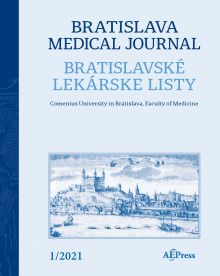Journal info
|
||||
Select Journal
Journals
Bratislava Medical Journal 2024 Ahead of print 2023 2022 2021 2020 2019 2018 2017 2016 2015 2014 2013 2012 Endocrine Regulations General Physiology and Biophysics Neoplasma Acta Virologica Studia Psychologica Cardiology Letters Psychológia a patopsych. dieťaťa Kovove Materialy-Metallic Materials Slovenská hudbaWebshop Cart
Your Cart is currently empty.
Info: Your browser does not accept cookies. To put products into your cart and purchase them you need to enable cookies.
Bratislava Medical Journal Vol.123, No.11, p.777–784, 2022 |
||
| Title: Radical gastrectomy with D2 lymph node dissection after neoadjuvant therapy | ||
| Author: Marian BAKOS, Tomas JANKOVIC, Stefan DURDIK, Ludovit DANIHEL | ||
| Abstract: OBJECTIVES: This study focuses on the evaluation of the effectiveness of radical gastrectomy with D2 node dissection after neoadjuvant therapy in the patients with gastric cancer. Gastric cancer is a widespread type of cancer, and it is the third leading cause of death in the cancer patients. Metastases most often occur in the lymph nodes and therefore, in addition to gastrectomy, lymph node dissection is often performed in the patients. We are distinguishing between D1, 2 and 3 dissections. As with other cancers, the effectiveness of neoadjuvant therapy is being considered, which aims to improve the patient’s prognosis and thus the 5-year survival rate. METHODS: Within the study, we evaluated a group of the patients diagnosed with gastric cancer (n = 41). The average age of the patients was 62.3 years (20–72 years). 68.3 % (n = 28) patients underwent neoadjuvant therapy before surgery, the remaining 31.7 % (n = 13) underwent only radical gastrectomy with D2 lymphadenectomy. In all the cases, an open operational approach was implemented. CONCLUSION: Lymphadenopathy was found in 85.4 % of the patients. Complications occurred in both groups, but in the group with neoadjuvant therapy their share was lower (14.3 % vs 23.1 %), while in the group without neoadjuvant treatment the proportion of duodenal leaks was higher, as well as the number of reoperations. In total, an average of 30 ± 8 lymph nodes were harvested. A lower number of T3–4 cases was found in the neoadjuvant group (17.9 % vs 61.6 %), confirming that the tumour size was significantly smaller in the neoadjuvant group than in the group, who did not undergo it and underwent only surgical treatment. Relapse was found in 29.3 % of the patients after neoadjuvant treatment and in 38.5 % of the patients without neoadjuvant treatment. Also, mortality due to relapse was higher in the group without neoadjuvant treatment (30.8 % vs 21.7 %). The average survival was 25 months (Tab. 3, Fig. 3, Ref. 60). |
||
| Keywords: radical gastrectomy, D2 lymph node dissection, neoadjuvant therapy | ||
| Published online: 26-Aug-2022 | ||
| Year: 2022, Volume: 123, Issue: 11 | Page From: 777, Page To: 784 | |
| doi:10.4149/BLL_2022_125 |
||
|
|
 download file download file |
|

